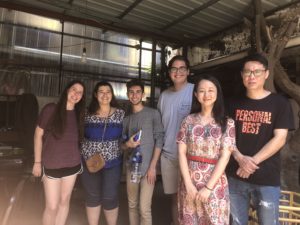Our professor instructed my group of four students to be in the lobby of the hotel by 11am for a local family visit. With no information about the family, where we were going, or what we would be doing I anxiously got ready for the day hoping to make a good first impression. The only thing that we knew for certain was that the family spoke very little English. A fact that our professor emphasized when we pressed for details about the day. This combined with my limited Chinese language skills was going to make for a very interesting visit.
When the car pulled up a middle-aged man got out and introduced himself before we got in the car to head back to the home. During the ride, we exhausted our vocabulary by sharing introductory information like our names, ages, family members, and majors. At this point, I started to panic because I began to realize that I still had to make it through the rest of the visit and I didn’t know how to say anything else. We drove in silence for the last few minutes of the ride and arrived at the home in downtown Xiamen.
As we drank our tea that was meticulously prepared and ate our self-stuffed dumplings, I began to relax as conversation began to flow. I surprised myself by the amount of vocabulary that I could recall and pull from to make conversation. I thought that I had exhausted my knowledge in the car but found myself being able to ask about their jobs, hobbies, and interests. Of course, there were instances of miscommunications, but together we always were able to figure out what the other person was trying to convey. An experience that I dreaded helped build confidence in my language ability.
Studying abroad gave me the opportunity to not only work on the grammar and vocab of another language, but it built my confidence and eased my fear of making mistakes. I realized that native speakers were excited to hear that I was learning theirlanguage and that they were patient and willing to help me as I struggled with the new skill.


